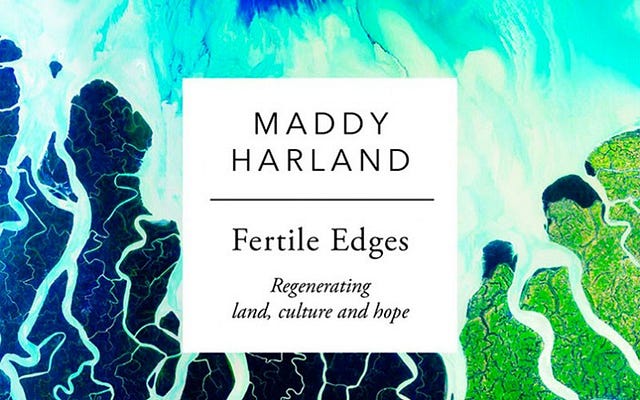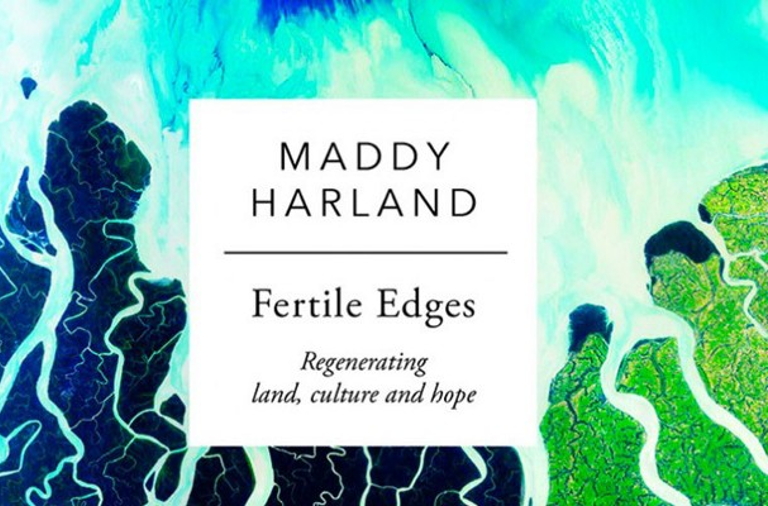Being the editor of Permaculture Magazine and many of the excellent books that Permanent Publications has made accessible to the movement puts my friend Maddy Harland in an excellent position to act as a midwife of the world many of us are longing to wake-up in and some of us have dedicated their lives to help co-create.
Maddy’s new book Fertile Edges — Regenerating land, culture and hope is a testimony to her doing just this in an eloquent, insightful and deeply caring way. The anthology of editorials of 25 years of Permaculture Magazine is the kind of book you can leave on the breakfast table and treat youself to a daily dose of inspiration one editorial at a time.

Fertile Edges weaves the patterns, people, and processes that are contributing to the emergence of diverse regenerative cultures everywhere into a beautiful tapestry of hope and courage to step up to the great work of our times and be part of the change. On the one hand, the tapestry offers glimpses of the more beautiful world many us can already hear breathing gently in our quiet moments — to paraphrase Charles Eisenstein and Arundhati Roy.
On the other hand, the tapestry invites us to face the horrors we are still bestowing on fellow human beings and the wider community of life. As Joanna Macy so aptly described, we need to act as hospice workers to a dying system that is structurally degenerative and unsustainable, and at the same time as midwives of the new: a regenerative human impact on Earth.
The book spans 25 years, hence giving us an opportunity to reflect where we have come from, what has changed, what still needs transforming, and how we can find the strength to keep getting up every morning with the firm commitment to be part of the solution and not part of the problem.
Maddy’s editorials offer us glimpses on multiple historical arches: humanity’s response to climate change, the emergence of the permaculture, ecovillage, and transition town movements, the fight against fossil and nuclear energy and for the transition to renewables, the slow transition towards a healthy food system that heals people and planet, the struggle against war and injustice … . Maddy invites us to reframe these struggles as the privilege of being alive in the time of the ‘Great Turning’, able to make a difference every day anew.
Fertile Edges pays homage to many of our fellow change agents, who chose to teach by the example their lives offer to us. The visionary woman who planted the seeds for the regeneration of the great forests of Africa:
“In the course of history, there comes a time when humanity is called to shift to a new level of consciousness, to reach higher moral ground. A time when we have to shed our fear and give hope to each other. That time is now.”— Wangari Maathai
The wise elder who taught the world about the power of forgiving grave injustice in order to heal the traumas of the past and build a brighter future for all.
“Overcoming poverty is not a task of charity, it is an act of justice. Like slavery and apartheid, poverty is not natural. It is man made and can be overcome and eradicated by the actions of human beings. Sometimes it falls on a generation to be great. You can be the regeneration. Let greatness blossom.”— Nelson Mandela
And the fearless teacher of non-violence who showed the world that daring to dream has the power to galvanize the masses and change the course of history.
“Our lives begin to end the day we become silent about things that matter.”— Martin Luther King Jr.
Fertile Edges offers a reminder of all the amazing work that is already going on around the globe. Paying attention to the visionaries dedicated to transforming entire systems in equal measure as celebrating the unsung local heroes whose tireless work is offering those vital inspirations that come from creating pockets of a regenerative future in the present.
From John D. Liu’s work documenting large scale ecosystems restoration, Albert Bates’ convincing case for ‘The Biochar Solution’, Polly Higgins’ campaign to end ecocide, Helena Norberg-Hodge’s astute critique of the globalized economy and decades of work in support of re-localization, Paul Allen’s life time commitment to the transition towards renewable energy and zero-emissions, to Joanna Macy’s sometimes gentle, sometimes fierce invitation to speak and act on behalf of all of life when we engage in the work that reconnects.
“We are here to bear witness to these extraordinary times and to maintain our gaze on the atrocities meted out to other human beings, the other species who share this planet with us and even whole bioregions.
We are here to take our place in the world and do what we can to work towards a peaceful, equitable, more biodiverse and abundant world. We are also here to discover more intelligent and balanced ways of living, and to quietly test them out ourselves. …
To deal with this, we need to develop our own sense of resilience and the capacity to find balance. Life is not only precious; it is a profound experiment in learning.
People often ask me where I draw my inspiration from. How do I keep going? I make it my responsibility to be as well informed as I can about all the ills of the world and the systems that exact the damage as I can. Then I make it equally my journey to learn more about the solutions: from the grand inspiring projects that regenerate whole landscapes to the small techniques we can use in our everyday life.”— Maddy Harland
Fertile Edges is also a celebration of the elders of the permaculture movement. Giving homage to Bill Molison, David Holmgren and Patrick Whitefield among many others. Maddy offers an abridged version of David Holmgren’s code to live by:
Reduce, reuse, recycle (in that order)
Grow a garden and eat what it produces
Avoid imported resources where possible
Use labour and skill in preference to material and technology
Design, build and purchase for durability and repairability
Use resources for their greatest potential use (e.g. electricity for tools and lighting, food scraps for animal feed)
Use renewable resources wherever possible even if local environmental costs appear higher (e.g. wood rather than electricity for fuel and timber rather than steel for construction)
Use non-renewable and embodied energies primarily to establish sustainable systems (e.g. passive solar housing, food gardens, water storage, forests)
When using high technology (e.g. computers) avoid using state of the art equipment
Avoid debt and long-distance commuting
Reduce taxation by earning less
Develop a home-based lifestyle; be domestically responsible
Fertile Edges is also somewhat autobiographical and a humble celebration of a servant leader who has given a voice to a whole movement of hopeful and committed human beings and a stage to their stories and their experiments in how to tread more lightly on this beautiful planet that we have been entrusted by our ancestors so that we may ensure that future generations of life can thrive in shared abundance.
On days when I need reminding that I am in this for the long haul, I think back to those days when Alice and I visited the ‘Sustainability Centre’ and Maddy and Tim Harland to ask for advice in our projects of wanting to set up an ecovillage and education centre in Southern Spain. So much as happened since those days in 2000. There are many more of us now and I choose the believe that the tide is turning. I am grateful that Maddy and Tim have offered me an example to just keep going. “Gratitude is one of the deepest secrets to happiness.” The awakening of which Maddy speaks below is firmly on its way. Regeneration rising! Trim-tabs unite!
“… I choose to act ‘as if’ — […] as if there will be a global awakening to our ecological predicament and radical changes implemented with unprecedented insight and wisdom; …”— Maddy Harland
[Ready to get your own copy? Best to buy the book directly from Permanent Publications.]





